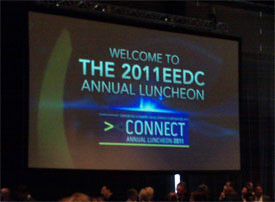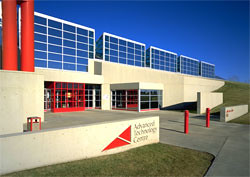How Edmonton is building a city of arts and technology champions
 Earlier this week I attended the Edmonton Economic Development Corporation’s (EEDC) annual luncheon to learn about how the city is gearing up for growth in the technology and innovation sectors.
Earlier this week I attended the Edmonton Economic Development Corporation’s (EEDC) annual luncheon to learn about how the city is gearing up for growth in the technology and innovation sectors.
The city’s goal is to be a top-five mid-sized global city. Edmonton is not trying to be known as the “tech hub of Canada.” Instead, the city’s aim is to build its own unique ecosystem in which a new, knowledge-based economy can thrive and supplement the resource-based economy in the province of Alberta.
Before the luncheon, I spent time talking to some of the movers and shakers in Edmonton who are leading the charge to transform the city’s future.
Here are some of the winning strategies that have been put in place to ensure the city’s success in the arts and technology sectors:
1. Build a supportive community and ecosystem from the ground up
What I found inspiring was the number of grassroots initiatives like Startup Edmonton and artScene Edmonton that are being led by passionate individuals who want to see their city thrive in the technology sector. In fact, the first ever Canadian Startup Weekend event took place in Edmonton.
Entrepreneurs like Ken Bautista, CEO and Co-founder of Rocketfuel Games, Chris LaBossiere, Co-CEO of Yardstick Software, and local technology blogger and software developer Mack Male are just some of the people involved in making things happen in the city.
Another interesting new venture that these folks told me about is the “Edmonton Champions Project.” The goal of this program is to empower a new generation of creative entrepreneurs, startups and projects in Edmonton. It’s part of the city’s plan to make Edmonton a creative and entrepreneurial hub that connects local talent with the world.
2. Merge the arts and technology sectors together
The keynote speaker at the EEDC luncheon, Deborah Wince-Smith, President, Council on Competitiveness said that in order to succeed as a knowledge-based economy in North America, you “need engineers to think like artists and artists to think like engineers.”
It appears that Edmonton is already on the right track in this regard as the city holds many community events to get these two sectors sharing ideas to spark innovation. Ken Bautista explained to me that he started-up artScene Edmonton roughly two years ago for that very reason.
3. Inspire change through leadership
The municipal government of Edmonton is also trying to become more innovative. Chris Moore, CIO of the Edmonton IT branch says that the city plans to adopt new software like Google Apps and use social media tools like Twitter and blogs more strategically in order to have more collaborative, open discussions among teams and with the public.
In addition, Chris LaBossiere is working with other entrepreneurs to convince local investors and government leaders to support the budding technology community in Edmonton. One of the most recent wins was getting the mayor of the city, Stephen Mandel to invest $15,000 per year of his own money into the “Edmonton Champions Project” over the next three years.
4. One city, one voice
The city has developed a “ONEdmonton” goal to unite the voices of all of Edmonton’s entrepreneurs towards a common vision. Key stakeholders have agreed that they all need to collaborate and “leave their egos at the door.” Ensuring that the city has “one united voice” helps to improve Edmonton’s chances for prosperity.
The city is also working to educate students at the University of Alberta and its “next generation” youth about the benefits of starting their own companies. In addition, a new accelerator program called “Flightpath” is underway to help fund and mentor 30 startups over the next 3 years.
 5. Provide support through research and innovation facilities
5. Provide support through research and innovation facilities
State-of-the-art facilities at the Edmonton Research Park and novaNAIT can help technology entrepreneurs with funding and mentorship.
Stuart Cullum, Executive Director at novaNAIT says that his institution “facilitates applied research and development,” which helps entrepreneurs to build commercially-relevant products and services.
Neil Kaarsemaker, Manager at Edmonton Research Park, gave me a tour of all of the buildings housed on the large mass of land owned by the city. Edmonton Research Park is home to many new startups, such as:
- Fission Media Group – a mobile app development company
- Bramm Technologies Incorporated – a software development and consulting company that creates online distance learning solutions
- VRStorm – a cloud computing platform
- Coole Immersive – a developer of 3D gaming software that helps to create simulation-based learning environments
6. Improve the quality of life to retain and attract new talent
Ultimately, all of these strategies have been put in place to help revitalize Edmonton’s image. The goals is to attract new workers to the city, while providing better opportunities for local talent at home.
The city has plans to build new transit systems, a more robust arts and entertainment district and more housing and condominiums in the downtown core. The aim is to emulate world-class cities like Austin, Texas – where the arts and technology communities are integrated.
Of course, Edmonton is not the only Canadian city that is trying to build a knowledge-based economy. In fact, Candace Brismead, VP of Technology Advancement at Edmonton Research Park, says that “building a knowledge-based economy is the new black.” What matters is that Edmonton is paving its own road to success.
Edmonton was just awarded a $400,000 grant from IBM as the first Canadian city to be named in their smarter cities challenge. As part of the grant, IBM consultants will work with the city staff to develop strategic projects.
With a solid plan in place and the energy and momentum that is already building in the city, the outlook for Edmonton’s future as a knowledge-based economy looks bright.
We’d love to hear how other Canadian cities are building up their knowledge-based economies.











